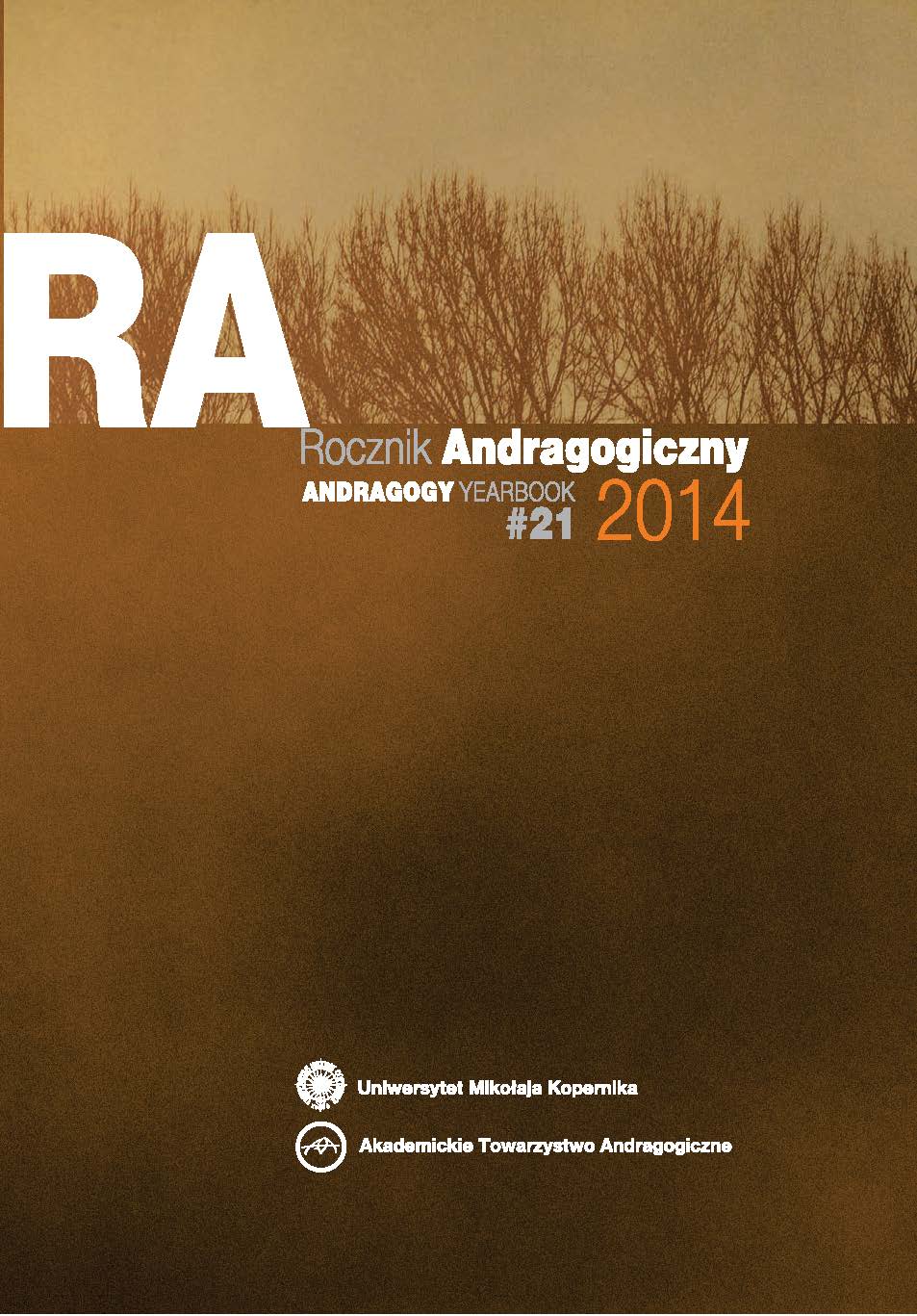Examining Adult Learning Through the Lens of Culture: A U.S. Perspective
DOI:
https://doi.org/10.12775/RA.2014.009Słowa kluczowe
uczenie się osób dorosłych, kultura, Stany ZjednoczoneAbstrakt
Badanie kształcenia osób dorosłych w ujęciu kulturowym w perspektywie Stanów Zjednoczonych
Zagadnienia zawarte w prezentowanym artykule dotyczą analizy wykorzystania aspektów kulturowych w literaturze Stanów Zjednoczonych. Artykuł porusza i skupia się na czterech obszarach literatury. Dotyczą one oceny krytycznej historii kulturowych własnych i innych osób, wykorzystanie społeczno-kulturowych podejść używanych do ułatwienia lub naprowadzenia uczenia się dorosłych, rozwijanie i utrzymywanie dialogu, oraz wprowadzenie strategii w celu poprawy świadomości kulturowej i kompetencji ludzi. W artykule zawarto sugestie możliwych obszarów dla przyszłych badań.
Bibliografia
Barber, P. D. (2003). Teaching non-English speaking students. Adult Learning, 14 (1), 29–30.
Banks, J. A., & Banks McGee, C. A. (1989). Multicultural education. Needham Heights, MA: Allyn & Bacon.
Berry, J. W. (2005). Acculturation: Living successfully in two cultures. International Journal of Intercultural Relations, 29, 697–712.
Bersch, G. T. (2005). Adventures in international adult education. Adult Learning, 16 (1), 8–10.
Chang, W. (2004). A cross-cultural case study of a multinational training program in the United States and Taiwan. Adult Education Quarterly, 54 (3), 174–192.
Chang, W. (2007). Cultural competence of international humanitarian workers. Adult Education Quarterly, 57 (3), 187–204.
Clover, D. E. (2010). A contemporary review of feminist aesthetic practices in selective adult education journals and conference proceedings. Adult Education Quarterly, 60 (3), 233–248.
Dass-Brailsford, P., & Serrano, A. (2010). The transformative effects of international education at an HIV/AIDS clinic in South Africa. Journal of Transformative Education, 8 (4), 269–285.
Daniels, D. (2003). Learning about community leadership: Fusing methodology and pedagogy to learn about the lives of settlement women. Adult Education Quarterly 53 (3), 189–206.
Ewert, D. M. (2000). Building intercultural understanding: The passenger in row 22. Adult Learning, 11 (4), 30.
Faux, N. R. (2004). Receta medica: Communicating medication information across the language/literacy divide. Adult Learning, 15 (1), 18–21.
Hill, L. (2004). Health literacy is a social justice issue that affects us all. Adult Learning, 15 (1/2), 4–6.
Hofstede, G. (1984). National cultures and corporate cultures. In L.A. Samovar & R.E. Porter (eds.), Communication between cultures (pp. 52–88). Belmont, CA: Wadsworth.
Ivers, J. J. (2007). Metacognition and foreign language cultural instruction. Journal of Transformative Education, 5 (2), 152–162.
Jarvis, C. A. (2003). Desirable reading: The relationship between women students’ lives and their reading practices. Adult Education Quarterly, 53 (4), 261–271.
Kerssen-Griep, J., & Eifler, K. (2008). When Cross-Racial Contact Transforms Intercultural Communication Competence: White Novice Teachers Learn Alongside Their African American High School Mentees. Journal of Transformative Education, 6 (4), 251–269.
Le Cornu, A. (2009). Meaning, internalization, and externalization: Toward a fuller understanding of the process of reflection and its role in the construction of the self. Adult Education Quarterly, 59 (4), 279–297.
MacDonnell, J. A., & Macdonald, G. (2011). Arts-based critical inquiry in nursing and interdisciplinary professional education: Guided imagery, images, narratives, and poetry. Journal of Transformative Education, 9 (4), 203–221.
Mayuzumi, K. (2006). The tea ceremony as a decolonizing epistemology: Healing and Japanese women. Journal of Transformative Education, 4 (8), 8–26.
Merriam, S.B., Caffarella, R.S., & Baumgartner, L.M. (2007). Learning in adulthood. (3rd ed.). San Francisco, CA: Jossey-Bass.
Mezirow, J. (1978). Education for perspective transformation: Women’s re-entry programs in community colleges. New York: Teacher’s College, Columbia University.
Rose-Cohen. (2004). Knowing ourselves so we may know others: reflections for a white facilitator of multicultural learning. Adult learning, 15 (1/2), 36–39.
Smith, R., & Neill, J. (2005). Examining the possibilities of school transformation for peace in Northern Ireland from a narrative perspective. Journal of Transformative Education, 3 (1), 6–32.
Sparks, B. (2002). A sociocultural approach to planning programs for immigrant learners. Adult Learning, 13 (1), 22–25.
Storrs, D. A., & Inderbitzin, M. (2006). Imagining a liberal education: Critically examining the learning process through simulation. Journal of Transformative Education, 4 (2), 175–189.
Tan, F. (2009). Tri-fold transformation: an international adult student’s reflections on online learning. Adult Learning, 20 (3), 38–40.
Taylor, E. (2006). Making meaning of local nonformal education: Practitioner’s perspective. Adult Education Quarterly, 56 (4), 291–307.
Tisdell, E. & Tolliver E. (2003). Claiming a sacred face: The role of spirituality and cultural identity in transformative adult higher education. Journal of Transformative Education, 1 (4), 368–392.
Vaynshtok, O. (2001/2002). Facilitating learning and transition among the refugee population. Adult Learning. 12/13 (4/1), 26–28.
Ziegahn, L. (2005). Critical reflection on cultural difference in the computer conference. Adult Education Quarterly, 56 (1), 39–64.
Pobrania
Opublikowane
Jak cytować
Numer
Dział
Statystyki
Liczba wyświetleń i pobrań: 630
Liczba cytowań: 0



